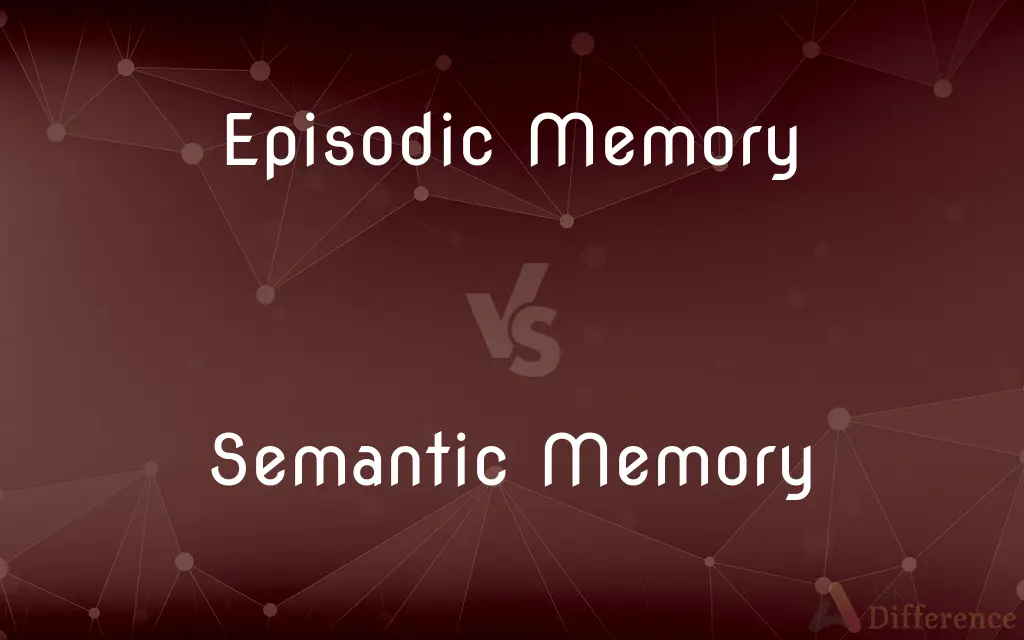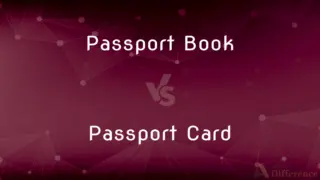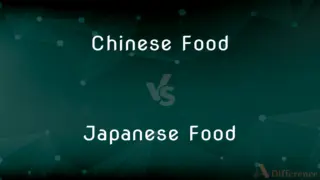Episodic Memory vs. Semantic Memory — What's the Difference?
Edited by Tayyaba Rehman — By Fiza Rafique — Published on November 14, 2023
Episodic memory recalls specific events in one's life, while semantic memory stores general knowledge and facts.

Difference Between Episodic Memory and Semantic Memory
Table of Contents
ADVERTISEMENT
Key Differences
Episodic memory is a facet of our memory system that involves the recollection of specific events, situations, and experiences. It's highly personal and subjective, often attached to emotions and contexts. Think of episodic memory as a personal diary of life events; it's the "I remember when" of our cognitive functions.
On the other hand, semantic memory pertains to general world knowledge that we've accumulated throughout our lives. This memory type isn't tied to personal experiences but instead to facts, ideas, concepts, and general knowledge about the world. If episodic memory is your diary, semantic memory is the encyclopedia.
Both episodic memory and semantic memory are subsets of our long-term memory. However, while episodic memory is about specific instances – such as the feeling of your first day at school – semantic memory would recall the general idea of what a school is and its purpose.
Yet, the lines between episodic memory and semantic memory can sometimes blur. For instance, through repeated recounting and reflection, specific episodic memories might transform into more generalized semantic memories over time.
Despite these overlaps, it's essential to recognize the unique features of both memory types. While episodic memory offers a window into our personal past, providing context, emotion, and sensory experiences, semantic memory gives us the foundation of shared knowledge, allowing us to communicate, understand, and navigate the world around us.
ADVERTISEMENT
Comparison Chart
Type of Information
Specific events, experiences
General knowledge, facts
Personal or General
Personal
General
Attachment to Emotion/Context
Often attached to emotions and specific contexts
Lacks personal emotion or context
Example of Use
Recalling one's wedding day
Knowing what a wedding is
Transformation Over Time
Can evolve into semantic memory through repeated recount
Remains relatively constant
Compare with Definitions
Episodic Memory
Memory of specific personal experiences and events.
Her episodic memory of the concert was filled with joy and excitement.
Semantic Memory
Memory of facts, concepts, and general knowledge.
His semantic memory was impressive; he could recite capitals of all countries.
Episodic Memory
A type of long-term memory tied to individual occurrences.
His episodic memory allowed him to recall the taste of the ice cream he had on vacation.
Semantic Memory
Memory system that stores common knowledge.
Her semantic memory was filled with historical dates and events.
Episodic Memory
Memory that can be explicitly stated and consciously recalled.
With his sharp episodic memory, he narrated the entire day's events.
Semantic Memory
Cognitive function that underpins language and understanding.
Due to his rich semantic memory, he excelled in trivia games.
Episodic Memory
The cognitive function responsible for storing life's episodes.
Thanks to episodic memory, he remembered the surprise party from five years ago.
Semantic Memory
Type of memory independent of personal experiences.
Thanks to semantic memory, she knew the rules of chess without recalling when she learned them.
Episodic Memory
Recollection that often comes with emotional and contextual details.
The episodic memory of their first meeting always brought a smile to her face.
Semantic Memory
Long-term memory of impersonal information.
The fact that the Earth orbits the Sun is stored in our semantic memory.
Common Curiosities
Can episodic memory transform over time?
Yes, with repeated recounting, episodic memories can become more generalized, resembling semantic memories.
Which memory type recalls personal experiences, episodic or semantic?
Episodic memory recalls personal experiences.
Is knowing a historical fact an example of episodic or semantic memory?
It's an example of semantic memory.
What events are stored in episodic memory?
Episodic memory stores specific personal events and experiences.
Does semantic memory involve personal feelings?
No, semantic memory stores general knowledge and facts without personal emotions.
Why can't I remember where I learned a fact, but I remember the fact itself?
The fact is stored in semantic memory, while the context of learning would be in episodic memory.
Can someone have a strong episodic memory but weak semantic memory?
Yes, individuals can vary in the strength of their episodic and semantic memory capacities.
Do we use semantic memory in daily conversations?
Yes, semantic memory provides the general knowledge we use in discussions.
Which memory is linked with emotions, episodic or semantic?
Episodic memory is often tied to emotions and specific contexts.
Which memory might be more affected in Alzheimer's, episodic or semantic?
Episodic memory is typically more affected in the early stages of Alzheimer's disease.
Is remembering a feeling from an event part of episodic memory?
Yes, feelings associated with specific events are part of episodic memory.
Do we need both episodic and semantic memory in daily life?
Yes, both memory types serve crucial roles in understanding, decision-making, and recalling experiences.
How do age and disease affect episodic and semantic memory?
Aging and some diseases can impact episodic memory more severely than semantic memory.
Is recalling a childhood memory an example of episodic memory?
Yes, recalling specific events from childhood taps into episodic memory.
How does semantic memory support language?
Semantic memory provides the meanings of words and general knowledge, essential for understanding and communication.
Share Your Discovery

Previous Comparison
Hardening vs. Quenching
Next Comparison
Passport Book vs. Passport CardAuthor Spotlight
Written by
Fiza RafiqueFiza Rafique is a skilled content writer at AskDifference.com, where she meticulously refines and enhances written pieces. Drawing from her vast editorial expertise, Fiza ensures clarity, accuracy, and precision in every article. Passionate about language, she continually seeks to elevate the quality of content for readers worldwide.
Edited by
Tayyaba RehmanTayyaba Rehman is a distinguished writer, currently serving as a primary contributor to askdifference.com. As a researcher in semantics and etymology, Tayyaba's passion for the complexity of languages and their distinctions has found a perfect home on the platform. Tayyaba delves into the intricacies of language, distinguishing between commonly confused words and phrases, thereby providing clarity for readers worldwide.
















































